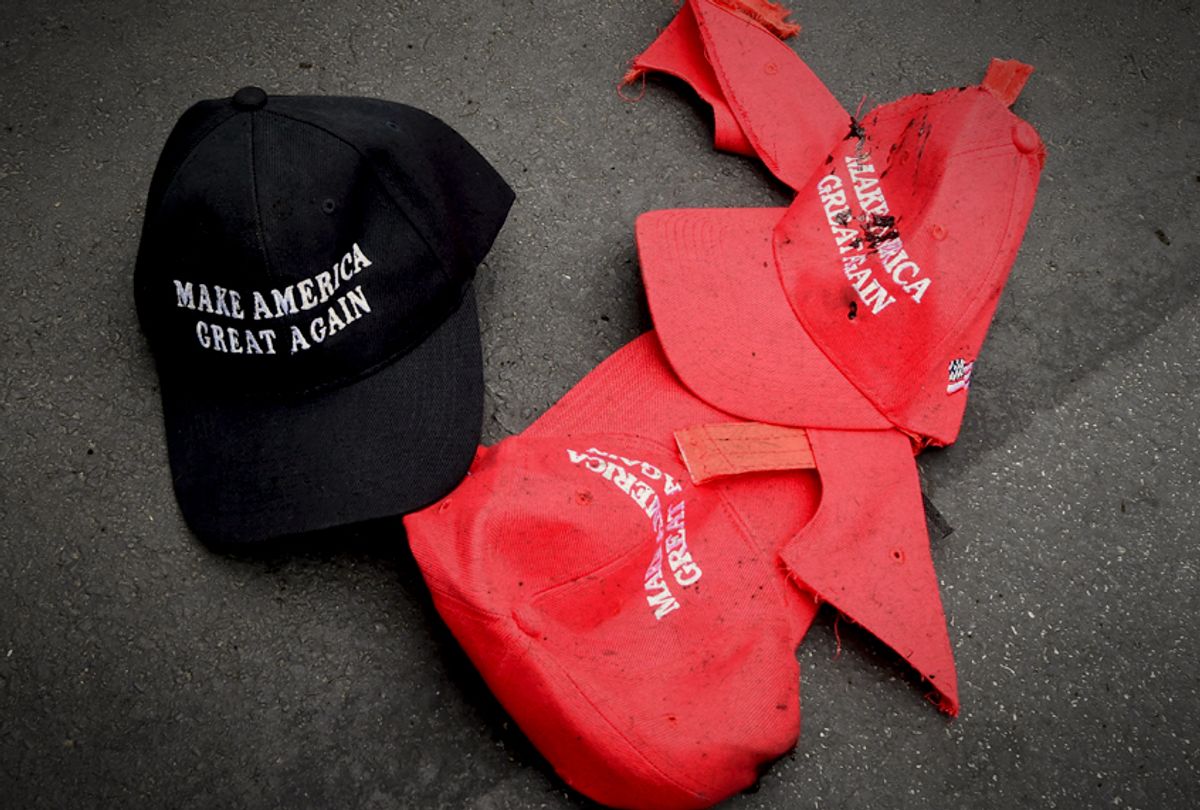The plural of anecdote is not data. Nevertheless, anecdotes, when combined with other information, can help to paint a fuller and more accurate picture of what is actually happening in society.
Here's an example. In a widely read story featured in the Lexington (Kentucky) Herald-Leader, columnist Tom Eblen spoke to the owners of local landscaping businesses who now face financial ruin because of Donald Trump's immigration "reforms," which mean they cannot find enough qualified workers.
Eddie Devine voted for President Donald Trump because he thought he would be good for American business. Now, he says, the Trump administration’s restrictions on seasonal foreign labor may put him out of business.
“I feel like I’ve been tricked by the devil,” said Devine, owner of Harrodsburg-based Devine Creations Landscaping. “I feel so stupid.”
Devine told Eblen it had been "years" since he could find "dependable, drug-free American workers" for his jobs mowing lawns and tending landscapes at cemeteries, shopping malls and apartment complexes. The pay is $12 an hour.
Devine said he believed Trump’s America-first promises. But cutting off a good supply of seasonal foreign labor when Americans won’t take those jobs is only hurting American business owners and the U.S. workers they employ, he said.
These workers aren’t immigrants, and there is no path to U.S. citizenship. When their seasonal work is done, they return home. That’s why Devine thinks the Trump administration’s stifling of guest-worker programs has more to do with racism than economics. “I think there’s a war on brown people,” he said.
But what makes him most angry is that Trump’s properties in Florida and New York have used 144 H-2B workers since 2016. “I want to know why it’s OK for him to get his workers, but supporters like me don’t get theirs,” Devine said.
What does this all reveal about Donald Trump and his supporters?
As sociologists, political scientists and other researchers have repeatedly shown, Donald Trump's voters are not the cast off, "forgotten Americans" of the white working class. The median income of Trump voters during the 2016 primaries was $72,000 a year. In other words, Eddie Devine, an upwardly mobile small business owner, is closer to the actual profile of a Trump voter than the chain-smoking, underemployed caricature conjured up by the mainstream news media.
Moreover, Donald Trump won every category of white voters across all income groups. Research has repeatedly shown that his voters were primarily motivated by racism, nativism, sexism, Christian nationalism and a need to maintain group dominance and power over nonwhites. It was not white "economic anxiety" that swept Trump into the presidency.
Devine's complaint about "a war on brown people," and his observation that Trump used immigrant labor at his resorts, signals to something intriguing. There are two possibilities about Trump's voters, which are not mutually exclusive. Either they voted for Trump because he is a racist or they voted for him despite his racism, which they did not see as a disqualifying character trait.
Trump's voters were not duped or tricked into supporting him. They made a conscious and intentional decision: Now some are upset that he has not honored his part of the bargain.
It's important to note that the disgruntled Trump supporters profiled by the Kentucky paper are outliers. Trump's popularity continues to remain steady. In many ways, his level of support among the American people in the aggregate is impressive, given his apparent disregard for American democracy.
Most importantly, Trump's voters continue to worship him. They are eager to follow his every command and to believe his lies as unvarnished truths. The political cult that is Trumpism remains compelling for those in its thrall.
Liberals and progressives (and some conservatives) still, despite the mountains of contrary evidence, believe in a folk theory of democracy. In this vision, voters are understood to be rational actors who possess well-developed political value systems, which they use to sort through information and make decisions that will maximize their material self-interest. In reality, American voters rarely behave that way. They are largely non-ideological and are becoming notably more tribal. And for many white conservatives, symbolic politics takes precedence: Maintaining the dominance of white Christian "culture" in an increasingly cosmopolitan and racially diverse country supersedes most other concerns.
Mainstream liberals and Democrats have largely been unable to solve the riddle of Trump or understand the behavior of the Republican Party over the last few decades. They are unwilling to accept that white Americans too often privilege the psychological wages of whiteness over economic and other material concerns. This has been one of the dominant stories of American history since before the founding; it shows no signs of abating or dissipating in an era of white backlash and perceived existential struggle against the "browning of America."
Eddie Devine's financial peril may be pleasurable for many liberals, never-Trump conservatives and others who believe that Trump's voters are due to receive their personal comeuppance. But even if such political schadenfreude feels good in the moment, it will not defeat the Republicans in the 2018 midterm elections, nor will it unseat Donald Trump in 2020.
Why? Because while Trump voters such as Eddie Devine may be angry that their Great Leader is causing them personal harm, most of them will vote for him anyway. As every old folktale will tell you, once you make a bargain with the devil, you can't take it back.



Shares